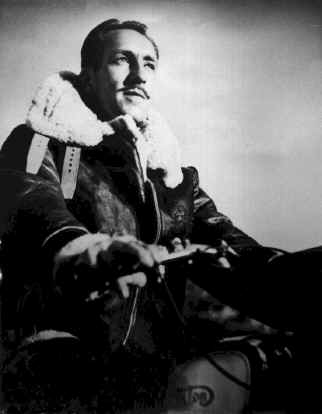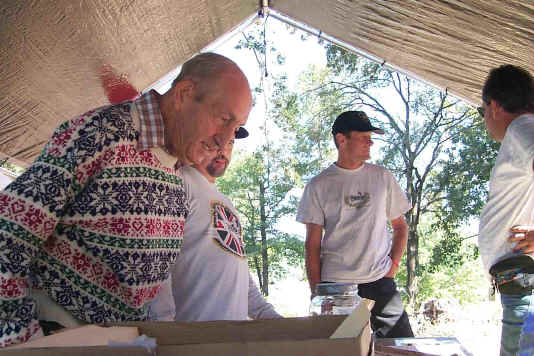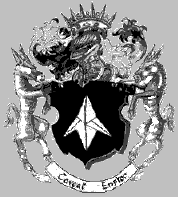On the trip over to England he and 2400 other freshly minted pilots were on a
ship that was built for the Mediterranean, so the Atlantic had its way with the ship and
passengers. To ensure the ship arrived safely with its cargo, it was escorted all the way
back to England.
Vic was assigned to the Hurricane Squadron. One of their tasks was to escort
the D-Day gliders. Vic was shipped off to Asia and there he flew out of Burma behind the
Japanese lines running what he calls a taxi service for 250 pound bombs. In time the
Hurricanes were dispatched to Europe but Vic stayed behind and flew P-47’s. After
Hiroshima, the Allied Forces had driven the Japanese out of Malaya, Burma, Borneo and
Sumatra. What was left of the Japanese army together with the very large number of
prisoners had retreated to the island of Java. Only four RAF squadrons were equipped with
P-47 aircraft due to the spare parts availability. These were selected to go to Batavia
(now Jakarta) Java to take over and rehabilitate the prisoners. These four squadrons had
the doubtful honor of being the last RAF operational squadrons in the War. Vic was
released from Her Majesty’s Service in early 1946 and returned to Southampton. He
took a civilian job with Marconi EKCO as a material’s buyer.
About 1947, Vic returned to the US with the help of a friend who assisted in
the Green Card paperwork. Vic found his way to Texas because of another good friend whose
folks were here. This pilot friend met an untimely death while flying. In Dallas Vic
started to work for the Dallas newspaper then moved on to an oilfield equipment company as
an inventory clerk. Opportunity knocked and Vic applied for and was accepted in an
accountant position. He stayed with this company until 1971. This company was the largest
oilfield company in the world but went bankrupt 10 years later.
Vic always had a love for the open road and Canada. Around 1961 he rode his
Vincent to Canada and claimed to be the first person to cross the Canadian Rockies on a
motorcycle. During that time Vic kept his 1948 Norton International and made 8 trips to
and from Canada on it. He’s proud to say that he had the trip down pat, taking only 2
½ days each way.
At the ripe old age of 57 he joined Vernon Hardwick’s BSA shop as a parts
man. However, when his mother passed away he needed to return to England for the services.
His employer promised to keep his position open but when he returned to Dallas, he found
that he had been replaced. After that he opened a small shop on 10th street in
Dallas near Davis street. There he charged his clients $5 per month for bike storage and
work shop privileges. This worked out quite well for Vic.
Well, that’s about it. By this time I was mentally exhausted. Vic on the
other hand seemed to be getting warmed up. I had taken in so much of Vic’s life, I
was concerned that I wouldn’t be able to decipher my own chicken scratching and keep
the details straight.
Composing this brief essay about Victor Toogood has been a great experience for
me and I hope for the NTNOA members as well. We are extremely fortunate to have a member
like Vic to tell us first hand about motorcycling in its infancy, how it influenced his
life and the resulting memories. So the next time you see Vic, take a few moments to
introduce yourself, and shake hands with the NTNOA’s one and only English Gentleman.
It’s a privilege to have Vic as an Honorary Member and one of the very early members
of the NTNOA.
[John Cary Yuill's tribute to Victor Toogood]
[Toogood: A Story - By Bev Bowen]
The Houston based classic motorcycle enthusiasts, including members of the BMOA, and BRMC will always have fond memories of Victor. For many years he attended the Annual New Ulm
Rally. Victor always camped out and was open to developing new friends while offering his intellect and wisdom for those within his presence. I will remember Victor as a kind man that always offered
inspiration. He will undoubtedly be remembered and missed by the many that were fortunate enough to make his acquaintance.
Posted by: John Martin Houston/Segui, TX - friend Dec 19, 2010
From: James Ingram
Sent: Thursday, December 23, 2010
To: ntnoa@ntnoa.org
Subject: Victor Toogood Remembered
It is with great sorrow that I heard about Victor Toogood’s passing. I wanted to relate a small story to you that happened at last year’s 2009 LoP rally. It was said the Vic had an exceptional
recall of faces and names. This is very true.
In the 1990s I was riding and hanging out with Jerry Hubbard. At some point (I am not sure exactly when) Jerry and I paid Vic a visit at his place down on Davis. We got the grand tour and as both Jerry and I were
mad for old British bikes, we were enthralled with everything he showed us. Fast forward to 2009. I was walking along the rows of bikes set up for judging that the 2009 LoP. At the registration tent sat Mr.
Toogood. He was alone so I thought I would go and renew old acquaintances. I said “hello” and shook his hand. He smiled, looked intently at my face and said “I know you. You came to my shop with that other fellow
several years ago.” I was dumbfounded. I can’t remember what I did yesterday much less the people I met ten years ago. After that we chatted like old friends.
Victor Toogood was a true gentleman and I grieve his passing. We need more gentlemen of his caliber and now we have one less.
James Ingram
Ingram And Friends.com
Leonard, TX
Vic’s Quotable Quotes
* From racing at Brands Hatch on an AJS R8: If its not
raining, it’s a good day for racing.
* On Vic’s decision to return to the States after the war: Well, I saw
how bloody much money you Yanks are paid for such bloody little work and so I decided to
get in on it.
* On Vic’s planned retirement to Barbados someday: Barbados because
there are beautiful sandy beaches full of lovely young ladies in bikinis, they speak the
Queen's English, and there are damn few Yanks!
* On when he will retire: Why, when I get old of course!
Some Memorable Times with Vic (from
Dave Howe a.k.a. Flat 2)
* Vic once worked for Doc Storm, organizing all the bits
in the attic. Vic was a sight blaring down Chalk Hill in his old Hillman with no top. When
it rained, he still blared down the hill, having donned his only proper rain gear - an old
pair of goggles. When the Hillman expired, it was the same drill, rain or shine, on his
trusty bicycle!
* In the late 60's, I met the other bikers at work and immediately began
hearing about "the old Englishman". At that time, his shop was down a dirt alley
in Oak Cliff. My friend had an old Matchless 500 single he was trying to keep running and
had lost a weird little shoulder bolt in the rear end. We went to Vic's and he was very
polite and cordial. We described the odd bolt and he said, yes he thought he had two of
them. He dug around in bins, boxes, tins, nooks and crannies for a while and came up with
the badly needed part. Cost – 35 cents!
* The first several LOTP rally's were held at "The Cove". There were
several small cabins, one which had a nice porch that overlooked the entire rally area.
Vic was appointed the Grand Marshal and received a cottage for his trouble. A large Union
Jack was placed on the porch railing and each morning Vic would come out, stand there by
the Jack and survey his domain. Quite a sight, the Englishman standing up there, waving to
his court, and in his best high-tea English, delivering greetings to NTNOA from Her Royal
Majesty, The Queen of the British Empire, complete with anecdotes from the Queen Mum and
Maggie Thatcher, all of whom he claims to know quite well, of course.
* Vic has always been happy to take on any task for NTNOA at the rally. His
main station is at the sign-up table working all day until late in the night. Then going
off to sleep wherever he could find - one year on the ground with only a single thin
blanket!
* The last motorcycle Vic rode, I am proud to say, was my BSA M20. This was at
the last LOTP at The Cove. Vic sheepishly came up and asked if I would mind terribly if he
road the M20 a short ways down the road. So with the W.W.II British India Campaign pith
helmet as a topper, he motored down the road. What a sight! The English gentleman, riding
British ramrod straight in the saddle, a dignified smile on his face, probably reliving
fine memories of riding all types of bikes over the decades. The M20 was given the name
"Victor" on that day. Vic seemed pleased and I certainly was.
Examples of
Some of Vic’s Bikes
| 1914 Douglas 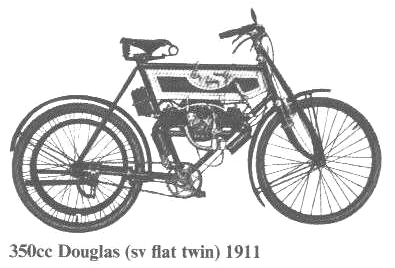
Flat twin, belt drive with
carbide headlamp. Vic’s first bike. Acquired at the age of 10. License plate LO 218 |
Montgomery
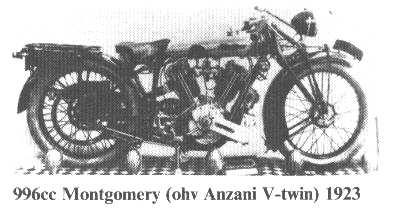
680cc JAP V-twin side valve. Same engine as placed in a Brough
Superior. |
1923
Raleigh
350 side valve. Originally owned by Lord Petre.
1913 Brown
3 speed in the rear wheel with oil lamp.
1928 BSA
Round tank 250 |
1929 BSA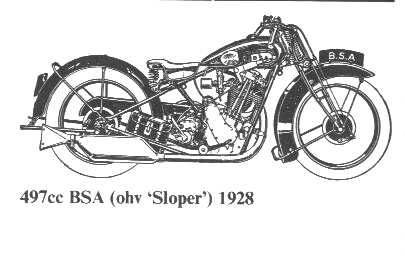
497cc BSA (ohv 'Sloper') |
1933 Royal Enfield Bullet
4 valve, 4 speed
1930 AJS
R-8 500cc racer |
1936 Norton Manx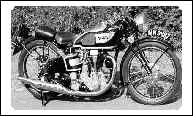
500cc single, fine racer but not a road bike. |
| 1947 Norton 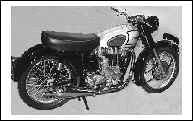
Model 30 500cc |
1951 Vincent Black Shadow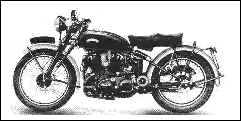
Purchased for $400.
|
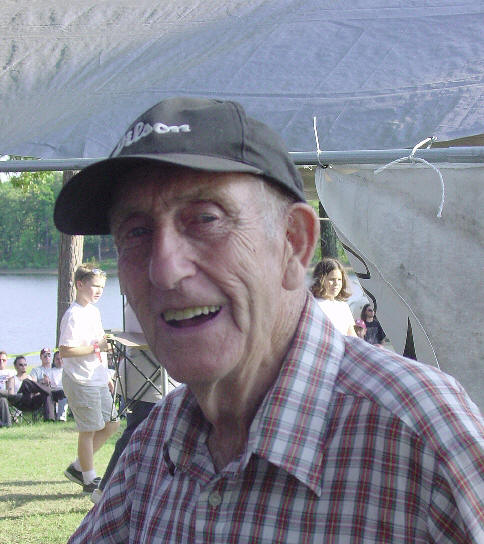
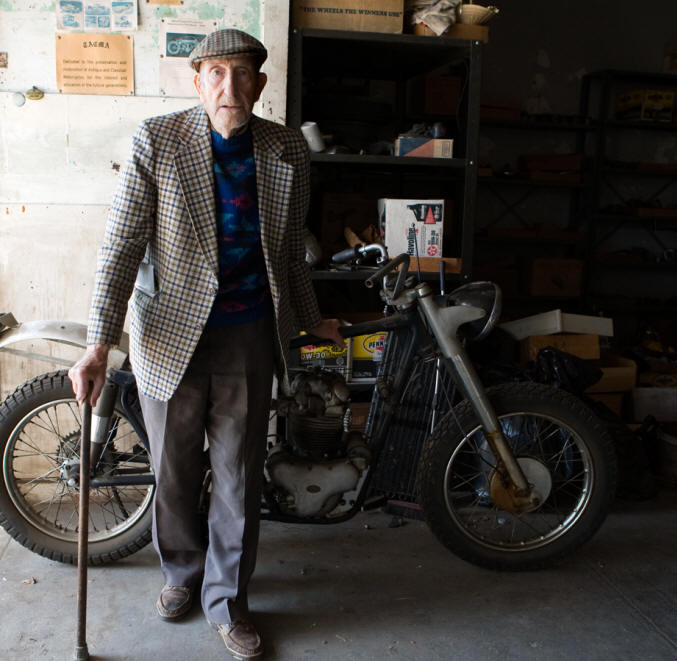 RIP Victor
“V” is for Victor
Victor Toogood is his name and as you might expect, he is British --- very British. He is tall, with a ‘ramrod’ military bearing, complete, as I recall, with a neatly trimmed mustache, and, of
course, that very proper British demeanor and unmistakable accent. I came to meet him many years ago in 1953 or 4 through my good friend, George Snow. He was, to paraphrase the title of a favorite Reader’s Digest
article, one of the most unforgettable characters I’ve ever met.
He was an accountant by trade but, I suspect, a frustrated motorcycle racer and mechanic by nature. I once heard he was a veteran of WW II and the ‘Battle of Britain’ where he flew Hawker Hurricanes against the German
F-109s and other planes. He never spoke of those times and I’ve always regretted not asking him if he wished to speak of them. Perhaps I will yet. But I digress.
George and I would spend hours over at Victor’s motorcycle ‘shop’. It wasn’t a shop in the conventional sense, but rather a place where he tinkered with his various assortment of ‘machines’, as he called them. He had a
seemingly endless assortment of cars and bikes --- all British. He still has an assortment of British motorcycles including the ever popular Norton, and the absolute king of British motorcycles, the Vincent Black Shadow.
He was extremely patient with us and was an eager tutor, showing us all about the ‘proper care and feeding’ of motorcycles. He was extremely meticulous and methodical about every thing he did. We learned how to do things
the right way.
However, he was not without his idiosyncrasies. As meticulous as he was with the maintenance of his ‘machines’, he seemed equally dispassionate about the appearance of those same ‘machines’. I would guess that not so
much as a cup of water, outside of a possible rain shower, ever graced the surfaces of any of his mechanical possessions. I can remember groaning with disbelief as I gazed upon that shrine of motorcycles, his beloved
Vincent, sitting there months after one of his yearly vacation trips around the U.S., caked with mud and dirt. It would stay like that till the next year and his next trip. The only dirt that ever got scraped off was
when he hovered over the bike, like it was a newborn baby, to work on some part that needed mechanical attention prior to his next great adventure.
Victor had a much greater influence on me at the time than either he or I understood. He introduced me to a world of fine British motorcycles and sports cars, mainly the MG- TC (I later owned a 1949 TC, the last year of
that series) and the 356 Porsche, both of which he owned among others. We have corresponded over the years at Christmas at which time he always sends, in addition to a personal note, a poem, penned in the most beautiful
cursive hand I’ve ever seen. I cherish his friendship to this day.
He is long since retired which has afforded him the time to contemplate the restoration of his many contraptions. However, I imagine that he is still ‘waiting for parts’ for most of them. I secretly suspect that, like
the fellow who builds a boat in his basement, he never really wants to complete any of his works for then he wouldn’t have anything to do. I know one thing, I would love to just one more time walk through the doors of
his ‘shop’ to see, smell, and take in all the sights of those wonderful ‘machines’ from a time when ‘British made’ reigned supreme in the world of motorcycles and sports cars.
Here’s to you, Victor. John Cary Yuill; 2004
|
